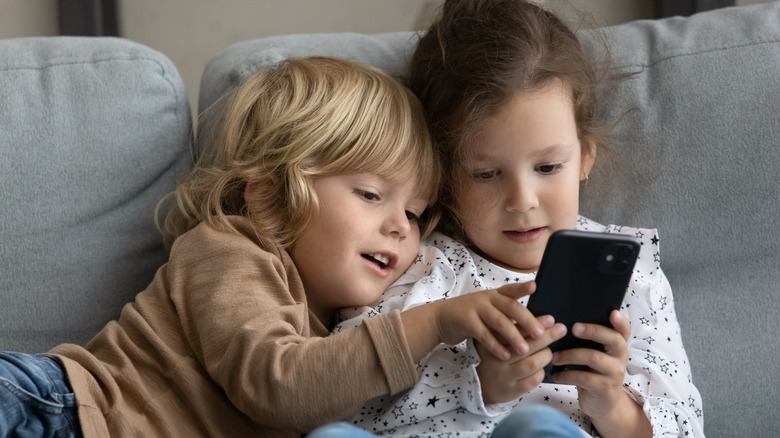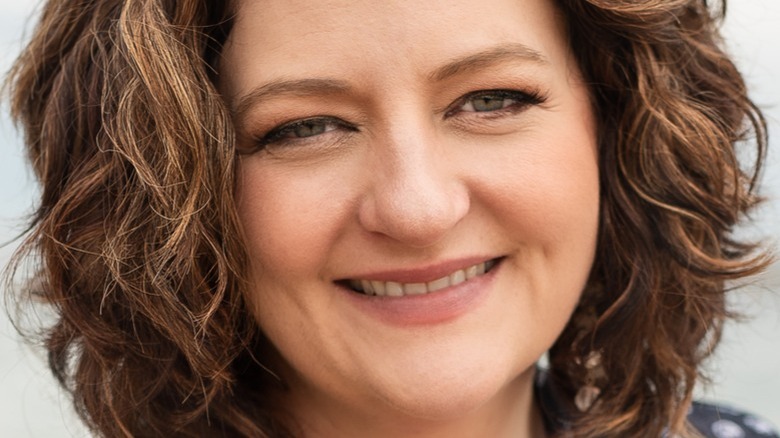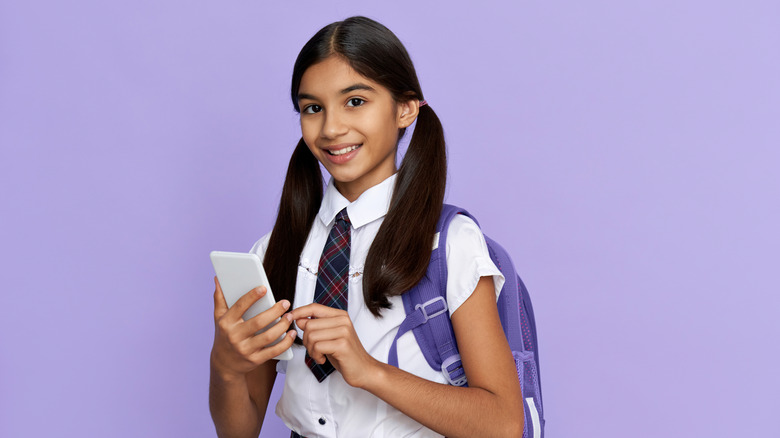Parenting Expert Says Keeping An Open Dialogue About Social Media Is Essential - Exclusive
Generation Alpha is the most recent moniker assigned to young people born between 2010 and 2024, according to a report from McCrindle. The inception of Gen Alpha was also the year that Apple announced and released its first-ever iPad (via Screen Rant). The increase in accessibility of the then-new technology came a monumental shift in the culture and rise in social media, which parents are still adapting to these days. For instance, the "iPad kid" trope became an online meme, depicting the current generation of babies, toddlers, and now, emerging teenagers as screen-obsessed anytime, anywhere. All jokes aside, data on social media usage when it comes to Gen Alpha is no laughing matter.
With screen and social media usage being ubiquitous amongst the current generation, it's on parents to have serious discussions around this cultural phenomenon with their kids. And although these online interactions can be seemingly innocent, there is also the likelihood many children will meet online friends. In 2015, Pew Research Center reported that 78% of girls meeting new friends online are meeting them via social media. For boys, it was 52%. In addition, there was a startling 2021 study published by Elsevier that reported during the various COVID-19 restrictions, consuming violent and abusive content online amongst young people significantly increased.
We know that setting boundaries with your kid isn't always easy, but luckily, we have someone who knows just how to handle it from a place of care.
Parenting expert Cathy Domoney's approach seeks to 'empower' children
Earlier this year, The New York Times reported that compared to years ago, kids' social media usage has increased significantly with the 8 to 12 age range. The pandemic is an obvious cause of this, and experts worry that as younger kids get online, the more susceptible they are to coming across inappropriate content. Fortunately, parenting expert and CEO of Parenting Evolution, Cathy Domoney, is here to offer advice to parents on how to establish an open dialogue with their children about their time online.
Domoney has shared advice with The List before on a variety of topics that affect parents and children — from how to broach the topic of gun violence to how to encourage children to stand confident in their individuality. Domoney's mission is to "empower" parents and children alike to help them reach their full potential in this ever-complicated world.
While speaking on the relevant issue of kids using social media, Domoney shared that she wants to encourage parents to hold space for open communication as opposed to conversations filled with judgment and oftentimes guilt on the child's part. Though it can be easy to have a reactionary attitude, Domoney's framework stems from a place where children can feel self-assured, which can make all the difference. "Keeping an open dialogue around these topics is essential," Domoney shared. "We have always maintained a 'non-reactionary' policy when it comes to discussing social media and online culture."
Having a line of communication can help when a parent is concerned
Since a staggering report in 2022, per The New York Times, showed that children have more access than ever to social media and are increasingly using social media platforms, it's imperative that parents take charge in a gentle, but firm way.
"Our kids have stumbled across some unfortunate things online and because of the sacred environment that we have worked hard to create, they are able to tell us so we can talk it through, without judgment, and navigate the situation together," parenting expert Cathy Domoney explains. As a parent, Domoney speaks on an experience regarding social media she handled with her daughter: "There was one online friend [of my daughter's] that worried me, so one day I sat her down and explained my concerns. I said that this one person may not be who they appeared to be, and asked if I could go through her phone to check the messages. ... My intentions for checking her messages were clear: I was investigating her safety."
Domoney shared, "On checking through the messages, I was satisfied that this person was real, and I never made another comment about it. I wanted to respect my daughter's right to express herself, I wanted to respect her privacy, and I also wanted to secure her safety, which is what I did. I think it is important to compartmentalize these things and allow our children the freedom they need to grow, within our firmly established boundaries."


